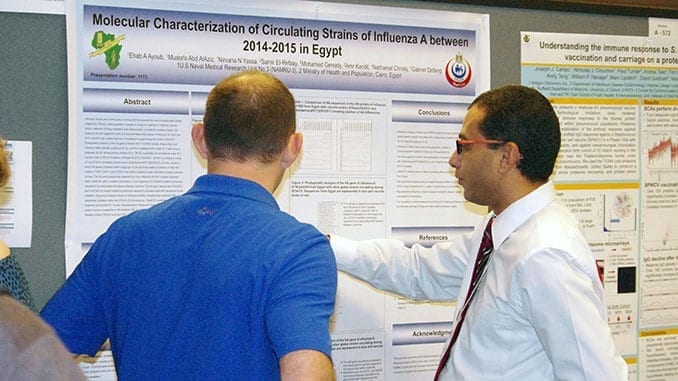
Researchers from the U.S. Naval Medical Research Unit-3 (NAMRU-3) presented data last week at the American Society of Tropical Medicine and Hygiene (ASTMH) annual meeting, highlighting their efforts to characterize genetic changes in flu virus strains.
The NAMRU-3 team, along with the Center for Disease Control and Prevention (CDC) partners, focused on characterizing the strain of the disease from samples from the 2014/2015 influenza season in Egypt, which typically runs from October to April.
The data is shared with World Health Organization influenza reference laboratories, and is an important step in the process of selecting the coming year’s influenza vaccine components.
“Our data supports the World Health Organization’s (WHO) recommendation of replacing (A/Texas/50/2012) with (A/Switzerland/9715293/2013), in the influenza vaccine composition for 2015/16 flu season,” said Ehab Saad, Medical Research Technologist, NAMRU-3.
CDC reported lower vaccine effectiveness rates, during the 2014-2015 influenza season (18 percent), the rates increased for the 2015-2016 season (59 percent).
“The findings of this research assisted in the prediction of the appropriate influenza strains for vaccine formulation and suggested the susceptibility of certain strains to vaccines. The data that is continuously generated is uploaded onto online data bases; NAMRU-3 has been a contributor to the seasonal flu surveillance and characterization for thirteen years,” said Saad.
“Alteration in the genetic properties of the virus can lead to antigenic changes. Antigenic changes might lead to severe infections. Tracking both genetic and antigenic drifts helps predict unprecedented disease outcomes,” explained Saad.
NAMRU-3’s mission is to study, monitor, and detect emerging and re-emerging disease threats of military and public health importance; develop mitigation strategies against these threats in partnership with host nations and international and U.S. agencies in CENTCOM, EUCOM, and AFRICOM areas of responsibility.
“Infectious diseases are historically responsible for more U. S. casualties than combat related injuries. Forums such as ASTMH, which is the principal professional organization dedicated to the prevention and control of tropical diseases, provide a forum to share results with stakeholders and collaborators,” said Cmdr. Kellie McMullen, Science Director, NAMRU-3.

